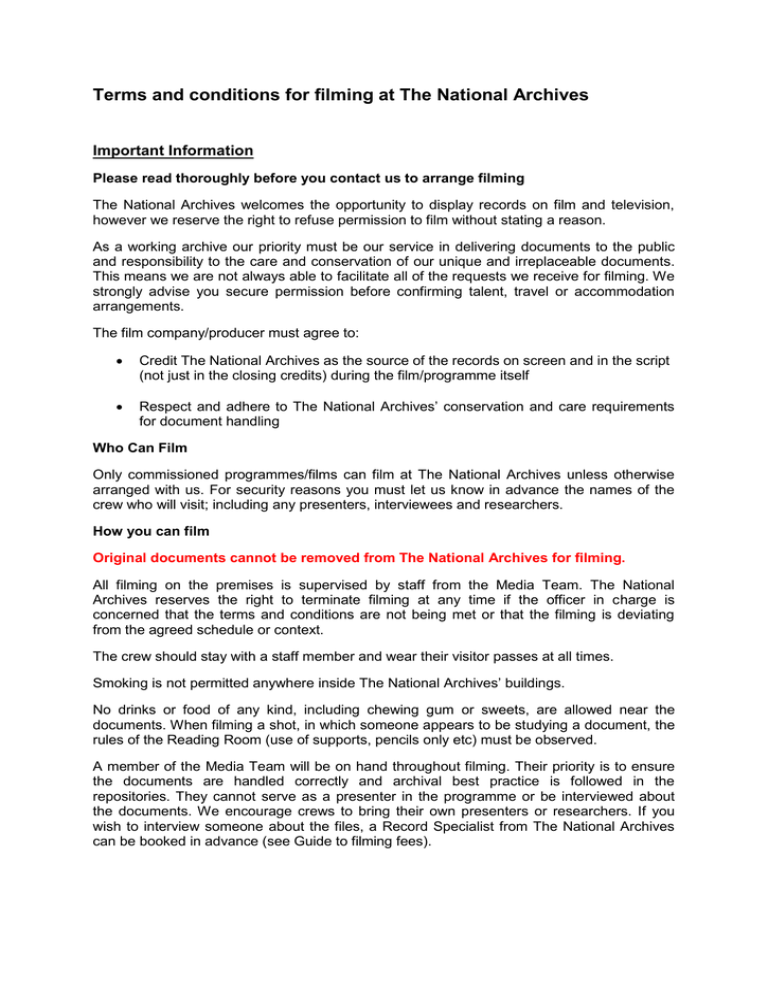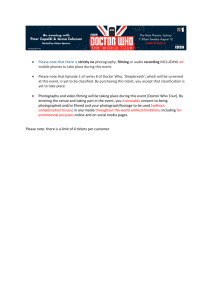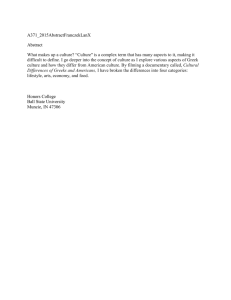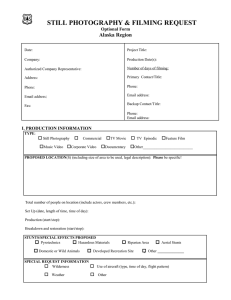Terms and conditions for filming at The National Archives Important Information
advertisement

Terms and conditions for filming at The National Archives Important Information Please read thoroughly before you contact us to arrange filming The National Archives welcomes the opportunity to display records on film and television, however we reserve the right to refuse permission to film without stating a reason. As a working archive our priority must be our service in delivering documents to the public and responsibility to the care and conservation of our unique and irreplaceable documents. This means we are not always able to facilitate all of the requests we receive for filming. We strongly advise you secure permission before confirming talent, travel or accommodation arrangements. The film company/producer must agree to: Credit The National Archives as the source of the records on screen and in the script (not just in the closing credits) during the film/programme itself Respect and adhere to The National Archives’ conservation and care requirements for document handling Who Can Film Only commissioned programmes/films can film at The National Archives unless otherwise arranged with us. For security reasons you must let us know in advance the names of the crew who will visit; including any presenters, interviewees and researchers. How you can film Original documents cannot be removed from The National Archives for filming. All filming on the premises is supervised by staff from the Media Team. The National Archives reserves the right to terminate filming at any time if the officer in charge is concerned that the terms and conditions are not being met or that the filming is deviating from the agreed schedule or context. The crew should stay with a staff member and wear their visitor passes at all times. Smoking is not permitted anywhere inside The National Archives’ buildings. No drinks or food of any kind, including chewing gum or sweets, are allowed near the documents. When filming a shot, in which someone appears to be studying a document, the rules of the Reading Room (use of supports, pencils only etc) must be observed. A member of the Media Team will be on hand throughout filming. Their priority is to ensure the documents are handled correctly and archival best practice is followed in the repositories. They cannot serve as a presenter in the programme or be interviewed about the documents. We encourage crews to bring their own presenters or researchers. If you wish to interview someone about the files, a Record Specialist from The National Archives can be booked in advance (see Guide to filming fees). Filming and the care of documents Documents are easily damaged and so they must be handled as little as possible. We will supply book-rests, backboards and other materials necessary for the display of documents. Our documents are valuable and irreplaceable so we impose restrictions on how they are handled. Excessive exposure to light is also detrimental, and the lighting levels and periods of exposure are kept to a minimum. Whilst filming every effort must be made to ensure that documents are not exposed to strong lighting for extended periods of time. The National Archives light fittings must not be altered but additional lighting can be used provided it is switched off between takes. Documents must not be marked in any way and the use of adhesives, such as Post-it notes is prohibited. Pages must not be removed from documents. The National Archives Collection Care department can be on hand to arrange documents onto handling/library aids and give guidance on how to handle the documents for an additional charge (see Guide to filming fees). We can also send you information leaflets and arrange training on document handling in advance of your visit if you would prefer In some instances, when filming original documents containing susceptible material types, the use of protective gloves (which we supply) may be required. Equipment used by film crews in The National Archives The National Archives reserves the right to determine the suitability of all equipment used in filming, including its electrical safety. No equipment without a current valid safety certificate, or which does not conform to the Safety Regulations of the Electrical Institute of Great Britain and suitable British Standards, may be used on the premises. No lights or equipment may be clamped to any fixed furnishings. The capacity of the electrical circuits, which concerns film crews, is that of any one 13 amp safety socket i.e. just over 2 kilowatts. In terms of arc or spotlighting this would be up to 1 x 2000 watt lamp or 2 x 1000 watt lamps (on a linked plug) on one 13 amp outlet. Multi outlet adaptors are forbidden even where the total wattage rating is within the 2 kilowatt guideline. Not more than 2 x 2000 kilowatt pieces of equipment should be put onto one ring-main as the overall fusing will be insufficient. Making a request to film We require at least 10 working days’ notice. To request permission to film, please complete the online application form available from our website (www.nationalarchives.gov.uk) and submit it to press@nationalarchives.gsi.gov.uk as far in advance as possible. We cannot hold dates unless a completed application form has been received however we are happy to discuss availability and potential timings. Please call the Press Office team on 0208 392 5277. When an online application form has been received we will send you an email acknowledgement; this does not constitute a definite agreement to film. Once we have given you permission to film, you will received a confirmation email detailing the date and time agreed along with the cost of the filming. Should you wish to cancel your booking at this stage please do so as soon as possible Following us granting permission for you to film, you will receive a confirmation notice. Should you wish to cancel your booking at this stage, please do so as soon as possible. Identifying the records you wish to film You are responsible for identifying document(s) you wish to film. The National Archives cannot undertake research on your behalf. All documents have a file reference and these must be submitted to the Press Office preferably with your application or at least five working days in advance of filming. We will order documents on your behalf to ensure they are ready for your arrival - no additional documents can be ordered on the day of filming. A maximum of 15 documents can be ordered per shoot, however it is only feasible to handle up to 5 documents within one hours’ filming. Documents ordered should be used for their content and not used only as a background prop setting. How to research records You can search our online Catalogue at nationalarchives.gov.uk/catalogue or for general advice on finding documents in the Catalogue telephone the Contact Centre on 020 8392 5200. Advice and detailed finding aids are available online and in our reading rooms. On site reader advisers can advise you about the different types of records and the sources relevant to particular subjects. To view original documents at The National Archives you will need a valid Reader’s Ticket. For visiting and last document ordering times go to nationalarchives.gov.uk/visit/times.htm Independent Research: Should you need support with your research we recommend the use of independent researchers vetted by The National Archives who are listed at nationalarchives.gov.uk/irlist/. You will need to negotiate a fee for this. Filming Information 1. Making a preliminary visit We strongly advise that you make a preliminary visit to look at the filming location, to ascertain timing, lighting etc. There is no charge for this. 2. Locations Tuesday to Saturday filming in public areas is restricted and will only be permitted under exceptional circumstances. We provide access to a repository (document storage area) however if filming occurs on a Monday we may also provide limited access to the reading rooms while we are closed to the public. Filming outside in the grounds of The National Archives is allowed. Permission should be sought at least 24 hours in advance. As this is an area used by members of the public, please ensure that your equipment does not create a hazard and that people are not inconvenienced in any way. There is no charge for this unless one of our records specialists is involved. While we will make every effort to accommodate your filming needs, please be aware that these are working areas, and in some instances filming/recording may be interrupted intermittently. For radio recordings, we have a small studio equipped with ISDN line (0208 392 5339) 3. Parking There is free public parking available however, this can get busy at peak times and we are not able to reserve spaces for film crews. 4. Timings Filming should take place in The National Archives premises between 9:30 - 12:30 and 1.30 – 4.30, Monday to Friday. The crew must be off site by 17:00. Out-of-hours filming can be arranged but would have to be negotiated well in advance and may incur additional costs for security. 5. Cancellation fees Cancellations or changes to a booking with less than 48 hours notice will be liable for a cancellation fee representing 20% of the total fee, plus VAT. 6. Handling Documents The National Archives Collection Care department can be on hand to arrange documents onto handling/library aids and give guidance on how to handle the documents for an additional charge (see Guide to filming fees). We can also send you information leaflets and arrange training on document handling in advance of your visit if you would prefer. 7. Insurance All film crews must provide evidence that they are adequately insured in advance of filming. We accept most general public liability company insurance. Any damage arising out of filming of The National Archives material either of persons or objects will be the responsibility of the client. 8. Invoicing Once the filming has taken place you will be sent an invoice by The National Archives for fees incurred and you will be given 30 days in which to pay. Please do not attempt to transfer money to The National Archives unless you have received a written invoice instructing you to do so. 9. Copyright Access for filming of public records is given with the authority of the Keeper of Public Records, under s.49 of the Copyright, Designs and Patents Act 1988. In many cases the material copied is still subject to copyright. Access is given on the understanding that it is the responsibility of those making the film, or photographic copies, to ensure that subsequent use of the copies does not infringe copyright. For further guidance on copyright please contact our Copyright Officer on copyright@nationalarchives.gsi.gov.uk Copyright of non-public records held in The National Archives is subject to greater restrictions. We may have to refuse access for filming or photography of such material unless permission has been obtained from the holder of the copyright. 10. Use of material Crown copyright material among the public records may be broadcast freely although an acknowledgement of the source of the material must be made. The National Archives cannot give permission for the use of material that is not Crown copyright, or advice on the current ownership of any copyright which may still subsist in it. No copyright application is required for general views of records in which detail of the contents does not appear on the screen. 11. Image library transmission fees To use images from the records, including photographs, you must seek permission from The National Archives’ Image Library, which will charge a transmission fee. Transmission fees are charged on all legible shots of documents held by The National Archives which are used in the broadcast version of your film. Charges are dependent on the number of images and transmissions and the breadth of the rights required for example: Two UK transmissions of one image = £113 plus VAT (£75 first flash and £38 repeat) Worldwide buyout of one image (all TV, media and in perpetuity) = £350 plus VAT It is your responsibility to contact The National Archives’ image library to determine charges and arrange payment. Email image-library@nationalarchives.gov.uk, call 020 8392 5225 or fax 020 8392 5266. 12. Crediting Source Material The National Archives must be credited on screen, and in the script, during the broadcast programme as the source of the records. Please inform The National Archives of the date and time of the proposed broadcast and forward to us an electronic version or DVD of the programme for our reference. 13. Social Media The National Archives reserves the right to mention the filming session, including the subject matter and document reference using social media including, but not exclusively Twitter, Facebook or in a Blog to be uploaded the day before, during, or after the programme is aired. The film company/producer agrees to accept that a photograph can to be taken at the time of filming to be used exclusively for the aforementioned functions. For further information please contact us on+ 44 (020) 8392 5277 or email us at press@nationalarchives.gsi.gov.uk


